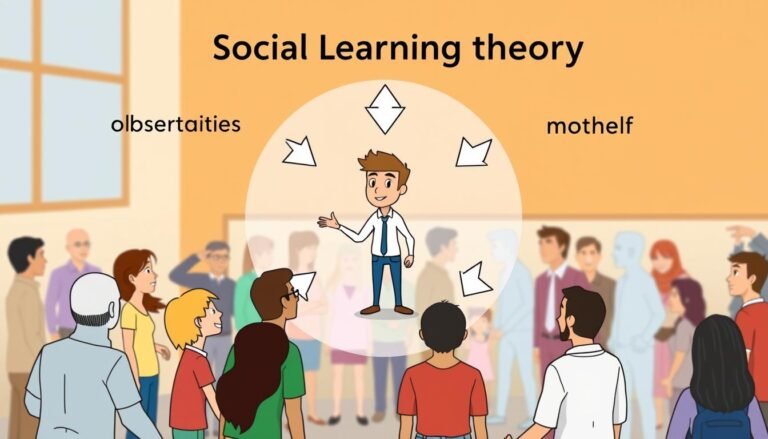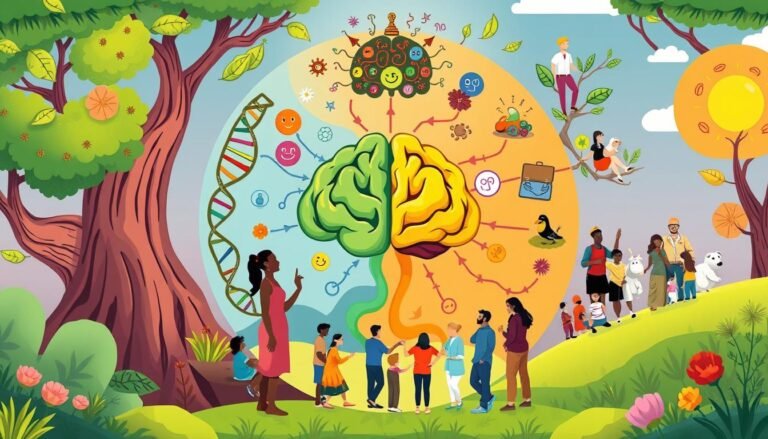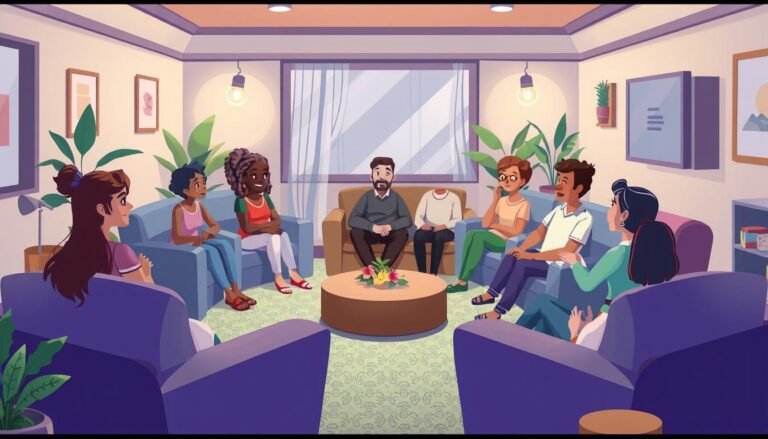Psychoeducation: Empower Your Mental Health Journey
Ever wonder why knowing about your mental health is so important? Psychoeducation is the answer. It’s a powerful tool that’s changing lives, one mind at a time. It’s not just about learning; it’s about changing how you see well-being.
Imagine knowing how to manage your mental health like a pro. That’s what psychoeducation gives you. It’s a game-changer in learning about therapy, giving you the knowledge to face challenges head-on. With this approach, you’re not just along for the ride in your mental health journey – you’re in control.
Did you know psychoeducation can cut down on relapse rates and improve treatment success? It’s true. By learning about your condition, you’re better prepared to deal with it. This form of learning isn’t just helpful; it’s life-changing.
Ready to learn more? Let’s see how psychoeducation can help you take charge of your mental health. It’s a step towards a healthier, happier you.
Understanding Psychoeducation and Its Core Components
Psychoeducation is a key part of mental health treatment. It teaches people about their conditions and helps them learn coping skills. This method works well with other treatments like Cognitive-Behavioral Therapy.
What Makes Psychoeducation Effective
The strength of psychoeducation comes from its structured approach. It gives clients specific knowledge about their diagnosis and symptoms. This understanding leads to better treatment outcomes.
For example, it’s shown great results in managing stress, depression, and anxiety.
The Role of Mental Health Education in Recovery
Mental health education is crucial in recovery. It empowers clients to make informed decisions about their care. This knowledge often leads to improved treatment compliance.
In some cases, psychoeducation has proven more effective than Cognitive-Behavioral Therapy for symptom relief.
Key Elements of Therapeutic Learning
Therapeutic learning in psychoeducation focuses on several key elements. These include Coping Skills Training and Emotional Intelligence Development. The goal is to help clients recognize crisis situations and develop self-help strategies.
| Element | Purpose |
|---|---|
| Information Transfer | Educate about symptoms, causes, and treatments |
| Emotional Discharge | Share experiences for emotional relief |
| Support for Medication | Encourage adherence to prescribed treatments |
| Crisis Recognition | Help identify and manage critical situations |
By combining these elements, psychoeducation creates a comprehensive approach to mental health care. It builds trust between clients and therapists, leading to more effective treatment outcomes.
Benefits and Impact of Psychological Literacy
Psychological literacy is a game-changer for mental health. It helps you understand your thoughts, feelings, and actions. This knowledge is crucial for managing stress and building resilience.
Improved Self-Awareness and Understanding
Learning about mental health gives you a deeper understanding of yourself. This self-awareness lets you recognize early signs of stress or anxiety. Then, you can use stress management techniques to tackle these issues before they get worse.
Enhanced Coping Skills Development
Psychological literacy teaches you how to cope with life’s ups and downs. These skills are essential for building resilience. They help you recover faster and stronger from tough times.
Better Treatment Outcomes and Recovery Rates
Understanding your mental health leads to better treatment results. When you know why your treatment is important, you’re more likely to stick with it. This can speed up your recovery and improve your life quality.
Strengthened Support Systems and Family Dynamics
Psychological literacy benefits you and your loved ones. It helps them understand what you’re going through. This can make your support system stronger at home. Family members can learn how to support you in practicing self-care strategies.
“Knowledge is power. The more we understand about mental health, the better equipped we are to take care of ourselves and each other.”
Boosting psychological literacy can make our society more aware and supportive of mental health. This leads to better mental health care and happier, healthier communities.
Implementing Psychoeducation in Mental Health Treatment
Psychoeducation is key in mental health care. It gives patients the knowledge to handle their conditions. Mental health experts use many ways to add psychoeducation to therapy.
Cognitive-Behavioral Therapy often includes psychoeducation. Therapists teach about thoughts, feelings, and actions. This knowledge helps patients learn to cope with their symptoms.
A study in Munich showed psychoeducation’s power. It cut rehospitalization rates from 58% to 41% over two years. It also shortened hospital stays for schizophrenia patients from 78 to 39 days.
- Psychoeducation sessions usually last 40-60 minutes
- Group sessions have 4-12 members
- Programs can last from 5 to 24 sessions
Therapeutic learning covers many topics. These include knowing about the illness, treatment options, and early signs of relapse. For bipolar disorder, it helps patients stick to their treatment, as half stop medication at some point.
Psychoeducation is an obligatory exercise program that serves as the foundation for further treatment measures for patients with schizophrenia.
Adding psychoeducation needs a personal touch. Mental health experts use many methods like interactive talks, written materials, and demonstrations. Building a good relationship and regular check-ins are key for success.
Building Resilience Through Educational Strategies
Building resilience is key to navigating life’s challenges. Psychoeducation offers powerful tools for developing this vital skill. Let’s explore how educational strategies can boost your mental strength and help you thrive.
Stress Management and Emotional Regulation
Mastering stress management techniques is crucial for resilience. Psychoeducation teaches you to identify triggers and develop coping mechanisms. By learning emotional regulation skills, you gain control over your reactions to stressful situations.
Research shows that individuals with strong emotional intelligence development are better equipped to handle life’s ups and downs. These skills not only improve mental health but also enhance overall well-being.
Developing Problem-Solving Skills
Effective problem-solving is a cornerstone of resilience. Through psychoeducation, you learn to approach challenges systematically. This approach empowers you to tackle obstacles head-on, reducing feelings of helplessness.
Studies indicate that students who receive resilience training show significant improvements in problem-solving abilities. These skills prove invaluable in both personal and professional settings.
Creating Sustainable Self-Care Practices
Self-care strategies are essential for long-term resilience. Psychoeducation emphasizes the importance of regular self-care routines. This includes physical activity, healthy eating, and adequate sleep.
- Engage in activities that bring joy and purpose
- Practice mindfulness and relaxation techniques
- Maintain strong social connections
By implementing these self-care practices, you build a strong foundation for mental health. Remember, resilience isn’t about going it alone. Reaching out for support when needed is a sign of strength, not weakness.
Conclusion
Psychoeducation is key in mental health education. It helps people understand and manage their mental health better. This approach gives individuals the tools they need to handle their mental health journey.
It uses different ways to teach, like one-on-one sessions or group workshops. This meets the needs of many people looking for help.
Psychoeducation does more than help individuals. It also helps reduce the stigma around mental health. This makes society more understanding and supportive.
It works well with therapies like CBT and DBT. This makes treatments more effective and helps people recover for a long time.
Even though there are challenges, like too much information or anxiety, the benefits are big. It’s important to keep improving how we teach mental health.
By doing this, we can give better care that fits each person’s needs. This is how we move forward in mental health treatment.
Source Links
- Psychoeducation: What It Is & How It Is Used in Therapy
- The Benefits of Psychoeducation | Canyon Creek Behavioral Health
- Reliable and Accurate Psychoeducation for your well-being
- How Psychoeducation Is Used in Therapy
- Psychoeducation: Definition, Goals and Methods
- The effectiveness of a psycho-education intervention on mental health literacy in communities affected by the COVID-19 pandemic—a cluster randomized trial of 24 villages in central Uganda—a research protocol
- How can psychoeducation help in the treatment of mental disorders?
- Clinical Practice Guidelines for Psychoeducation in Psychiatric Disorders General Principles of Psychoeducation
- Factors impacting the implementation of a psychoeducation intervention within the mental health system: a multisite study using the consolidation framework for implementation research – BMC Health Services Research
- Psychoeducation: A Basic Psychotherapeutic Intervention for Patients With Schizophrenia and Their Families
- Adapting and Implementing a School-Based Resilience-Building Curriculum Among Low-Income Racial and Ethnic Minority Students
- How to build resiliency
- Conclusions – Psychoeducation with problem-solving (PEPS) therapy for adults with personality disorder: a pragmatic randomised controlled trial to determine the clinical effectiveness and cost-effectiveness of a manualised intervention to improve social functioning
- Psychoeducation for Mental Health and Well-Being








